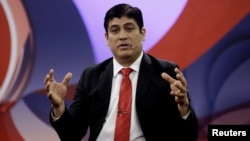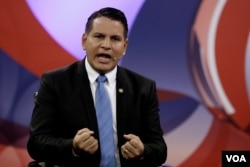Costa Rica’s ruling party presidential candidate says he will slash the country's growing fiscal deficit by half if he wins Sunday’s run-off election, a contest in which economic concerns have taken a back seat to a debate over gay marriage.
Center-left hopeful Carlos Alvarado Quesada of the ruling Citizens’ Action Party, 38, trails in some polls behind conservative evangelical Fabricio Alvarado Munoz, while others show the pair running neck-and-neck.
Alvarado Quesada, who unlike his opponent supports gay marriage, told Reuters on Monday he aims to shrink the deficit from 6.2 percent to 3 percent of gross domestic product (GDP) by 2022.
The deficit is set to grow by one percentage point next year, authorities and credit rating agencies have warned.
The current administration, where Alvarado Quesada once worked in the Social Development and Labor ministries, was blocked by a divided congress over the last four years from passing measures to create a value-added tax (VAT), cut public salaries and tax capital gains.
Fitch downgraded Costa Rica's rating from stable to negative in January, citing “institutional gridlock” that has thwarted fiscal reform and warning that more delays will raise risks to growth.
However, debt has now increased so much that parties previously opposed to tax reform may support it to avoid further economic malaise, Alvarado Quesada said.
“The competitive advantage I have is that time has run out,” he said in an interview at an organic market in the capital.
Lawmakers have been discussing a 13 percent VAT rate, more modest than an originally proposed 15 percent, but he said that was “not enough.”
His opponent Alvarado Munoz has yet to present concrete proposals to stem the growing deficit and crime rate, instead focusing on opposition to gay marriage, sex education and abortion.
Maintain floating system
Alvarado Quesada says he opposes the export sector’s demands to devalue the colon currency and wants to maintain the floating exchange rate while making central bank interventions more transparent.
But he pledged to support agricultural and industrial sectors by negotiating better terms for joining the Pacific Alliance trade pact with Mexico, Colombia, Chile and Peru.
In the fight against record crime, Alvarado Quesada rejected his rival's “firm hand” stance, saying it would aggravate violence. He also criticized President Luis Guillermo Solis’ handling of corruption cases that have rocked the government.
He repeated his support for gay marriage, contrasting with his opponent who gained widespread support in the conservative country after rejecting an Inter-American Court of Human Rights ruling to legalize same-sex unions.
“I did not hide my position for political gain. I was honest with citizens (even though it was unpopular),” Alvarado Quesada said.
However, the novelist and ex-rock singer’s anti-abortion stance highlights the limits to his progressive agenda.
Alvarado Quesada is proposing to develop specific regulations to better enforce a 50-year-old law allowing a pregnancy to be terminated only if the mother's health is at risk. He said this will better protect women who are often unsure of their rights due to the stigma of abortion.






